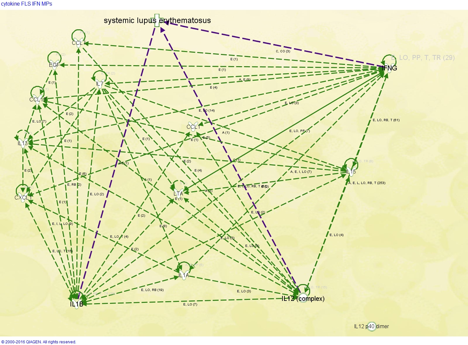Session Information
Date: Tuesday, November 15, 2016
Title: Systemic Lupus Erythematosus – Human Etiology and Pathogenesis - Poster II
Session Type: ACR Poster Session C
Session Time: 9:00AM-11:00AM
Methods: Human monocytes (THP-1) were treated with no additives or 100-1,000 U/mL of IFN γ for up to 72 hours to induce apoptosis. Apoptosis was assessed by measuring levels of caspase 3/7. Differential centrifugation was performed to obtain the MP and exosome fractions. A light scattering device (Nanosight) was used to determine the mean size and concentration of particles. Washed MPs and exosomes from apoptotic and normal THP-1 cells were added to human synoviocytes (Cell Applications) and incubated for 24 hours. The human cytokine antibody array (Abcam) was used to assess quantities of cytokines in conditioned media under various conditions.
Results: IFNγ at concentrations of 1000 U/ml successfully induced apoptosis in THP-1 cells as shown by a clear increase in caspase 3/7 levels (p< 0.03) (Figure 1). Both mean size (p<0.05) and concentration (p<0.001) of particles were increased over controls after 72 hours of IFNγ treatment. The addition of equal quantities of exosomes derived from apoptotic and normal cells produced similar synovial cell cytokine levels. In contrast, MPs from apoptotic cells produced a dramatic increase in an array of cytokines largely involving IL-1beta and interferon pathways compared to those from normal cells (Figure 2).
Conclusion: MPs from apoptotic cells induce an inflammatory response in synoviocytes, while this was not true of apoptotic exosomes. Our findings support major differences in the function of these two types of extracellular vesicles. They also lend additional support to a potential role for apoptotic MPs in the manifestations of clinical SLE.  Figure 1. Interferon ˠ induces apoptosis. Caspase 3/7 activity was measured as a marker for apoptosis after treatment of THP-1 cells with 1000 u/ml IFN γ. Staurosporine (1 µM) was used a positive control.
Figure 1. Interferon ˠ induces apoptosis. Caspase 3/7 activity was measured as a marker for apoptosis after treatment of THP-1 cells with 1000 u/ml IFN γ. Staurosporine (1 µM) was used a positive control. 
To cite this abstract in AMA style:
Bettendorf B, Mitton-Fitzgerald E, Gohr C, Rosenthal AK. Apoptotic Microparticles, but Not Exosomes, Induce an Inflammatory Response in Synoviocytes [abstract]. Arthritis Rheumatol. 2016; 68 (suppl 10). https://acrabstracts.org/abstract/apoptotic-microparticles-but-not-exosomes-induce-an-inflammatory-response-in-synoviocytes/. Accessed .« Back to 2016 ACR/ARHP Annual Meeting
ACR Meeting Abstracts - https://acrabstracts.org/abstract/apoptotic-microparticles-but-not-exosomes-induce-an-inflammatory-response-in-synoviocytes/
